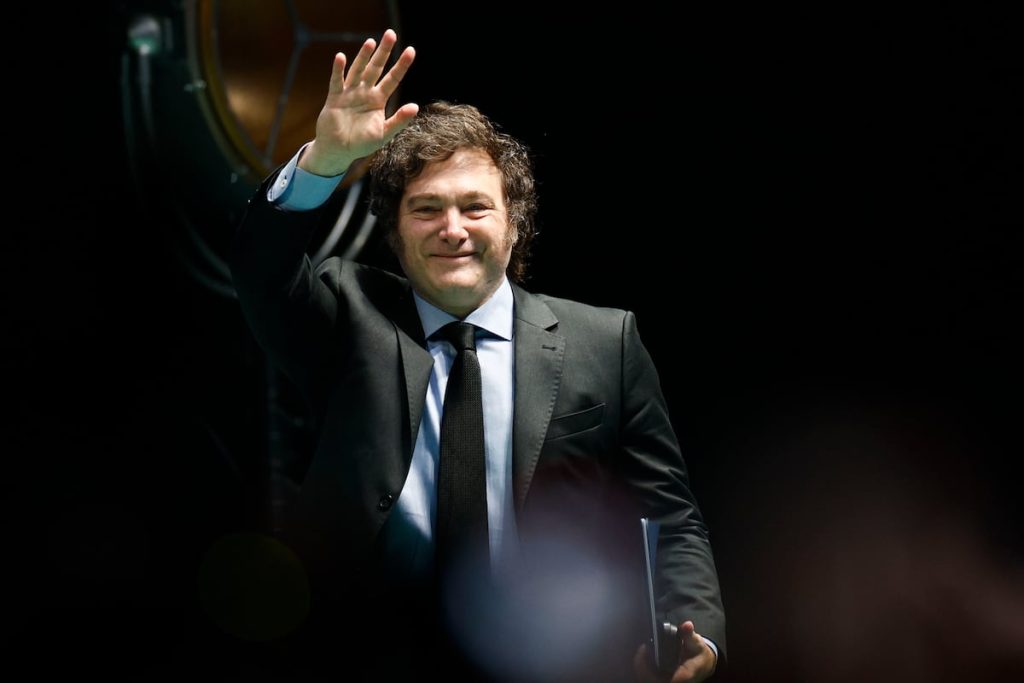In Argentina, one of the most indisputable things is the INDEC, the public institute that offers the main economic figures. Everyone, on both sides of the parliamentary spectrum, respects its numbers. A quick look at its website explains much more clearly than any political analysis why Javier Milei has traveled to Madrid to wage a “cultural battle” against “leftists” (for him, almost all of humanity, not just progressives, as he includes there a large part of the moderate right, the UN, the IMF, and even the Davos businessmen whom he sees as being devoted to socialism). It also explains why he called the wife of the democratic leader of the country he is visiting “corrupt”, something unprecedented in any minimal diplomatic use.
Argentina is in a deep economic recession, which Milei’s adjustment and the enormous price increases caused by his first liberalizing measures have only worsened. Inflation is at 8.8% monthly, 289% annually, 65% so far this year, with Milei already in charge. And yet he considers the 8.8% monthly rate a success because it decreased compared to the previous month, during a recession with very slow consumption. The economy is falling at an annual rate of 3.2%. The manufacturing production index is plummeting at a rate of 21% annually. Construction is falling by 42%.
Milei needs to talk about cultural battles against “socialism”, to confront Sánchez, and anyone who represents global progressivism, rallying the right “against the leftists” to whom one should not “concede anything even when it seems they are right”, as he said in Vistalegre, because his economic analysis does not withstand even the slightest contrast with the data. The Argentine president, amid great applause, argues that socialism leads to poverty and death. But since for him socialism is almost everything, including practically all European governments, that would imply assuming that Europe is much worse off than Milei’s Argentina or will be soon. Something difficult to defend seriously.
In addition, Argentina has not always been, as Milei suggests, in the hands of those he calls “socialists”, in reality a mix of Peronists with a lot of ideological mixture, including a lot of right-wing elements. For 10 years (1989-1999), it was led by Carlos Menem, who implemented liberal policies that Milei likes. In fact, some of those who are currently in power with Milei were part of Menem’s economic team. The result was that everything ended up exploding in 2001, including the corralito. And then there was Mauricio Macri (2015-2019), who supports Milei, and ended up in an IMF rescue. And then, yes, there were the Peronists and things worsened even further, which is why Milei won the elections, amid the collapse of credibility of Alberto Fernández’s government.
Milei has burned all bridges. Some argue that this is a response to the attack by Minister Óscar Puente. In reality, Milei’s spokesperson, Manuel Adorni, officially declared that crisis closed after a harsh statement in which the Argentine president stated that Sánchez puts Spanish women at risk by allowing illegal immigration. It does not seem likely, therefore, that it is a delayed reaction to Puente. Milei already went to Davos to accuse the world’s biggest capitalists of surrendering to socialism. He is a provocateur who thrives on tension, and he probably would have done the same or something very similar without the need for Puente to talk about his drug use, which the government saw as a slip-up.
Milei is in a different dimension. He does not need help or excuses to provoke. It is his natural place, the one that has brought him success, the same one that led him to say that the Argentine Pope is “the representative of evil on Earth” and then, once elected, to go to Rome to embrace Jorge Mario Bergoglio. There are no limits in the world of Milei. Everything is irrelevant if it works to generate attention and provocation, to occupy all the media space and leave the opposition disappeared, as all his heirs learned from the great master, Silvio Berlusconi. And yet, not even Berlusconi would have dared to go as far abroad. Sánchez, on the other hand, had to swallow his pride in Rome when he called Meloni “cara Giorgia” to try to ease tensions between the two governments with opposing ideologies. Milei seems delighted with this battle, despite the serious consequences for two countries that cannot afford a diplomatic crisis of this level with all the interrelationships that cross them.


